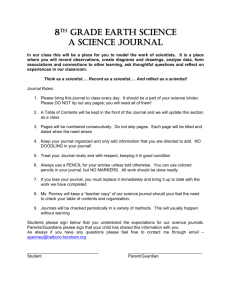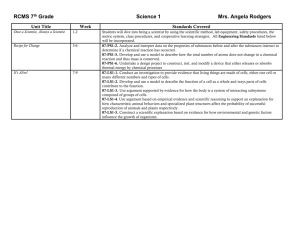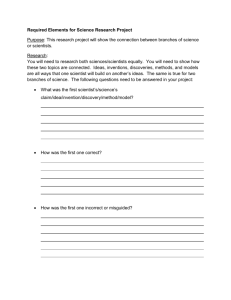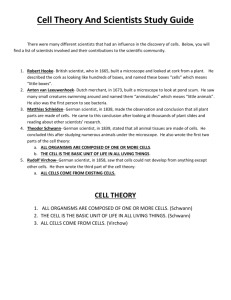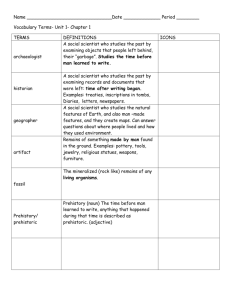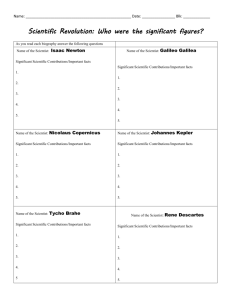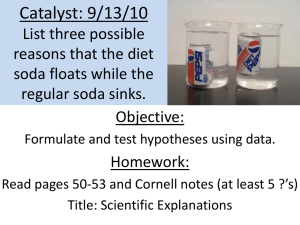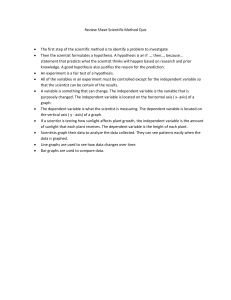The Development of Science
advertisement
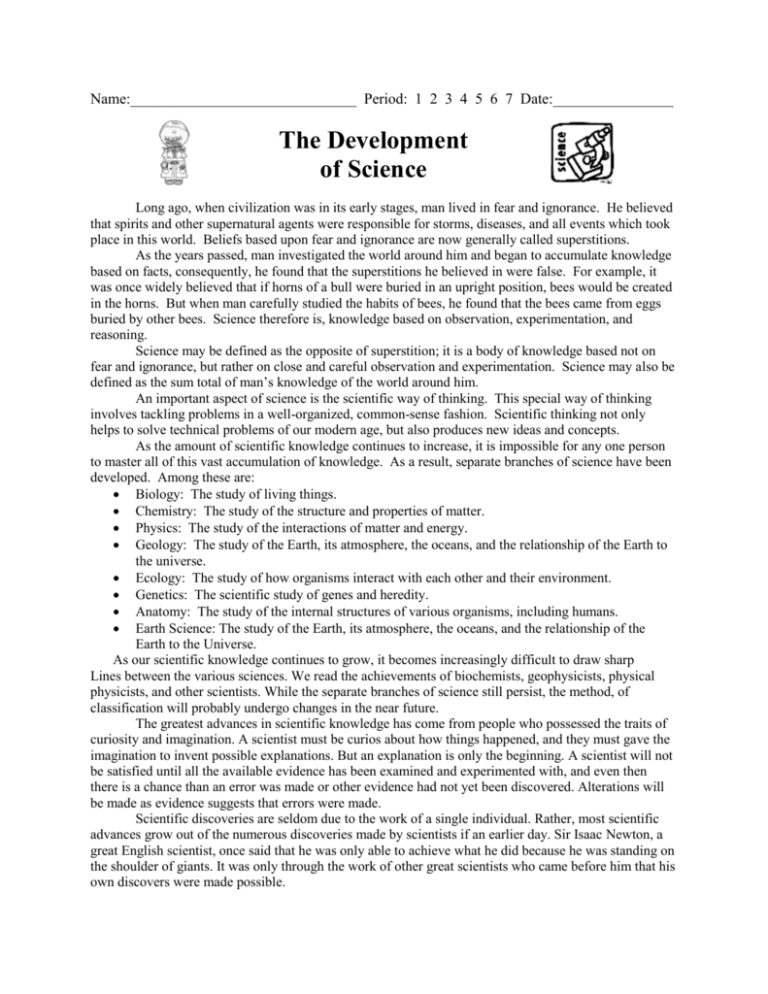
Name:______________________________ Period: 1 2 3 4 5 6 7 Date:________________ The Development of Science Long ago, when civilization was in its early stages, man lived in fear and ignorance. He believed that spirits and other supernatural agents were responsible for storms, diseases, and all events which took place in this world. Beliefs based upon fear and ignorance are now generally called superstitions. As the years passed, man investigated the world around him and began to accumulate knowledge based on facts, consequently, he found that the superstitions he believed in were false. For example, it was once widely believed that if horns of a bull were buried in an upright position, bees would be created in the horns. But when man carefully studied the habits of bees, he found that the bees came from eggs buried by other bees. Science therefore is, knowledge based on observation, experimentation, and reasoning. Science may be defined as the opposite of superstition; it is a body of knowledge based not on fear and ignorance, but rather on close and careful observation and experimentation. Science may also be defined as the sum total of man’s knowledge of the world around him. An important aspect of science is the scientific way of thinking. This special way of thinking involves tackling problems in a well-organized, common-sense fashion. Scientific thinking not only helps to solve technical problems of our modern age, but also produces new ideas and concepts. As the amount of scientific knowledge continues to increase, it is impossible for any one person to master all of this vast accumulation of knowledge. As a result, separate branches of science have been developed. Among these are: Biology: The study of living things. Chemistry: The study of the structure and properties of matter. Physics: The study of the interactions of matter and energy. Geology: The study of the Earth, its atmosphere, the oceans, and the relationship of the Earth to the universe. Ecology: The study of how organisms interact with each other and their environment. Genetics: The scientific study of genes and heredity. Anatomy: The study of the internal structures of various organisms, including humans. Earth Science: The study of the Earth, its atmosphere, the oceans, and the relationship of the Earth to the Universe. As our scientific knowledge continues to grow, it becomes increasingly difficult to draw sharp Lines between the various sciences. We read the achievements of biochemists, geophysicists, physical physicists, and other scientists. While the separate branches of science still persist, the method, of classification will probably undergo changes in the near future. The greatest advances in scientific knowledge has come from people who possessed the traits of curiosity and imagination. A scientist must be curios about how things happened, and they must gave the imagination to invent possible explanations. But an explanation is only the beginning. A scientist will not be satisfied until all the available evidence has been examined and experimented with, and even then there is a chance than an error was made or other evidence had not yet been discovered. Alterations will be made as evidence suggests that errors were made. Scientific discoveries are seldom due to the work of a single individual. Rather, most scientific advances grow out of the numerous discoveries made by scientists if an earlier day. Sir Isaac Newton, a great English scientist, once said that he was only able to achieve what he did because he was standing on the shoulder of giants. It was only through the work of other great scientists who came before him that his own discovers were made possible. You are a scientist! Does that statement surprise you? If it does, it’s probably because you don’t understand exactly what a scientist is. But if you have ever observed the colors formed in a drop of oil in a puddle or watched a fire burn, you were acting like a scientist. You are also a scientist when you watch wave breaking on the shore or lightning bolts darting through the night sky. Whenever you observe the world around you, you are acting like a scientist. Scientists observe the world around them, just as you do. For that reason, whenever you make an observation you are acting like a scientist. But scientists do more than just observe. The word science comes from the Latin scire, which means “to know.” So science is more than just observation. Scientist not only observe, but they wonder what makes thing the way they are And they attempt to find answers to their questions. The universe around you and inside of you is really a collection of countless mysteries. It’s the job of scientist to solve these mysteries. The goal of science is to understand the world around us. Using facts they have gathered, scientists propose explanations for the events they observe, then they preform experiments to test their explanations. Based in all this information we are going to define science as: Knowledge based on observation, experimentation, and reasoning. The application of scientific knowledge to solve practical problems and to make new inventions is called technology. Cracking the Code How is solving a cryptogram similar to what a scientist may do? Try crack this code, which conceals a definition of science written by the 19th century French scientist and mathematician Jules-Henri Poincare. HXRVMXV RH YFROG FK DRGS UZXGH, ZH Z SLFHV RH DRGS HGLMVH. YFG Z XLOOVXGRLM LU UZXGH RH ML NLIV Z HXRVMXV GSZM Z SVZK LU HGLMVH RH Z SLFHV. KLRMXZIV, 1885 To help you, here are two decoded words YV HXRVMGRURX BE SCIENTIFIC Write your decoded answer below:
